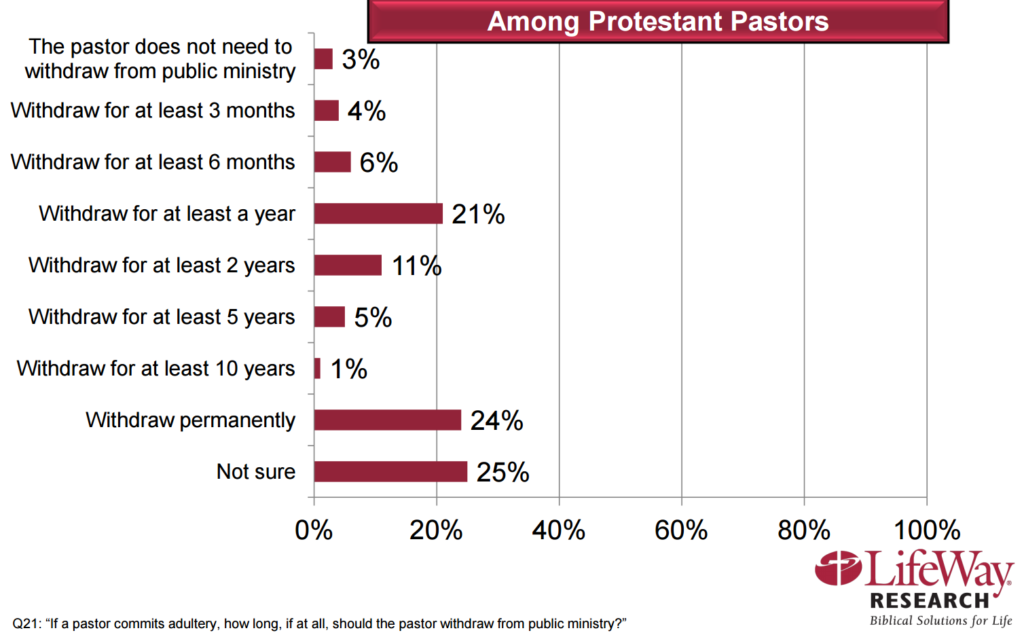How to Handle a Church Staff Person’s Moral Failure

Sam Rainer
Few models exist on how to handle the moral failure of a staff person. Indeed, there is little consensus among pastors about what to do, even with something as explicit as adultery. In a recent survey, LifeWay Research asked pastors, “If a pastor commits adultery, how long, if at all, should the pastor withdraw from public ministry?” As you will see, the answers vary greatly.

Surprisingly, 1 in 4 pastors (not church members) are unsure of how long a pastor should withdraw from ministry after committing adultery. As the above figure demonstrates, about 1 in 5 pastors believe withdrawing for a year is wise. But another 1 in 4 pastors believe permanent withdrawal from ministry is the best option. A few even believe three months or less is appropriate. If a pastor is dealing with the moral failure of a staff person and calls peers for advice, the likelihood is high those peers are going to give widely different answers. How can a pastor have discernment in such a situation?
The Path Forward after a Moral Failure
How should you discern a plan of action following the moral failure of a staff person? Obviously, you handle a staff person struggling with gluttony differently than a situation involving adultery. The following questions will help you determine a path forward with a staff person after a moral failure.
What is the degree of offense? Avoid making quick decisions if possible. When leaders make emotional decisions, the repercussions are often not good. Take the necessary time to understand the entire situation. Too many leaders make the mistake of finalizing decisions without hearing from all of the involved parties. When analyzing the situation, no leader should act alone. When staff moral failures occur, leaders need the advice of trusted counselors within the church and outside the church.
Does the staff person deny it or not? Allegations of a moral failure are much different than an admission of a moral failure! A majority of pastors (73%) believe allegations should be kept in confidence with church leaders during an investigation. If the staff person denies the allegations of a moral failure, the path forward must include an investigation. You should meet with the accuser and the staff person, separately first, and you should not meet with them alone. Bring in the elders, the personnel committee, or whatever group helps oversee the staff. If no such group exists, then bring in a couple other trusted church leaders.
What is the level of remorse? If the staff person admits to the moral failure, then you should discern the level of remorse. When a broken staff person is ready to repent, then the process should include much grace. When a staff person is defiant, then the process should include firm discipline.
What are the church’s policies and/or covenant? Many churches have clear guidelines detailing the process of working through a moral failure. Many churches also have a covenant for pastors and staff, which helps provide biblical support for the process of discipline or reconciliation. Before you move forward with a plan, make sure you understand the guidelines in the church’s policies, as well as any covenantal requirements of staff.
Leading Your Church to Heal
When a staff person has a moral failure, you must not only have a plan for the guilty individual but also the church. Both the staff person and the church need a path forward towards healing. First, you must tell the truth. The church should know about the moral failure. It is impossible to heal unless you know what hurt you. There is no need to share all the details, or even the other parties involved, but the church should understand the big picture of what happened. Second, if you are the lead pastor, then you must teach about healing. Put the current sermon series on hold and focus on teaching your church about healing. Third, it is important to spend time with people, especially those most affected by the moral failure. Put your vision on hold. The season of healing from a moral failure is not the time to launch new endeavors.
The hurt may last for a while. The pain may feel intolerable. You may even be tempted to go to another ministry just to get away from the situation. But leading your church to heal is paramount. Churches facing this type of pain need their pastors to own the situation and demonstrate the grace of Christ. One day, Jesus will remedy all the pain. Lead your church to believe it.







I wonder if the SBC has ever considered a restoration ministry for pastors who have a moral failure? Many times I’ve seen this situation end with a pastor/staff member resigning to never enter ministry again. It would be excellent for the fallen person to have a process, at the end of which, someone could vouch for their spiritual health if they feel led to attempt to reenter ministry.
I’ve been in contact with several churches in the state asking if there is a procedure they follow in the case of an allegation of sexual misconduct or moral failure involving a pastor, or individual (adult) in a leadership capacity. I am surprised at how many have nothing in place. I am wondering if any one can direct me to an organization who has a policy in place..
My question is in regards to adults and not children. In those cases, in my state, clergy are mandatory reporters (and I would report it even if it weren’t mandatory). Does LifeWay have an info? If not can you direct me to some one wo has?